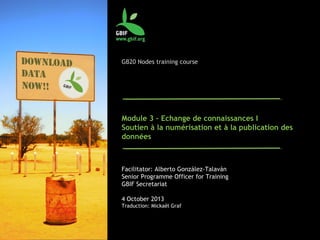
Module 3 - FR - Echange de connaissances I: Soutien à la numérisation et à la publication des données
- 1. GB20 Nodes training course Module 3 – Echange de connaissances I Soutien à la numérisation et à la publication des données Facilitator: Alberto González-Talaván Senior Programme Officer for Training GBIF Secretariat 4 October 2013 Traduction: Mickaël Graf
- 2. Résumé Séance de débat et d'échange de connaissances sur les meilleures pratiques pour aider à la numérisation des données et leur publication sur le réseau GBIF, qui est l'une des fonctions principales des points nodaux du GBIF, mais qui est aussi l'une des plus difficiles. Nous nous concentrerons sur l'élimination des obstacles sociaux et culturels à la publication de données pertinentes. Avec cette présentation, nous voulons simplement mettre quelques idées sur la table pour commencer les discussions. Cette présentation fait partie du module 3 du cours de formation GB20 pour les nœuds donné en Octobre 2013 à Berlin, Allemagne.
- 3. Plan 1. Les obstacles à l'édition des données 2. Niveaux de restriction de données 3. Les stratégies visant à soutenir la numérisation des données et leur publication 4. Ressources
- 4. Obstacles 1. Manque de connaissance 2. Manque de compréhension 3. Manque de volonté 4. Valeur perçue des données 5. Questions de confidentialité 6. Absence d'autorisation 7. Manque de temps/planning 8. Manque de moyens 9. Manque de fonds 10. Manque d'infrastructures Obstacles psychologiques et culturels Obstacles pratiques Obstacles liés aux ressources Obstacles institutionnels
- 5. Niveaux de restriction de données 1. Refus de partager. 2. Refus de partager jusqu'à ce que l'utilisation. prévue des données soit terminée. 3. Partage payant des données. 4. Partage des données avec des restrictions. 5. Partage libre des données.
- 6. Stratégies 1. Faciliter l'accès à un soutien financier. 2. Appel à des engagements ou des mandats légaux. 3. Appel à un accès ouvert/principes moraux. 4. Montrer les avantages d'une meilleure gestion des données. 5. Montrer les avantages pour les carrières scientifiques. 6. Pression des pairs 7. Démarrer/soutenir de grands programmes de numérisation. 8. Démarrer/soutenir les efforts de rapatriement des données.
- 7. GB20 Nodes training course Module 3 – Echange de connaissances I Soutien à la numérisation et à la publication des données Facilitator: Alberto González-Talaván Senior Programme Officer for Training GBIF Secretariat 4 October 2013 Traduction: Mickaël Graf
Notes de l'éditeur
- Template image composed from images by J amie Brelsford (United Kingdom) and anant12 (India), obtained trhough stock.xchng (http://www.sxc.hu/photo/604932, http://www.sxc.hu/photo/1426670)
- On these points: Lack of knowledge: The holder may not be aware how sharing on the internet works, and the existence of initiatives such as GBIF. Lack of understanding: the holder may have heard about GBIF and data publishing, but thinks it must be complicated, bureaucratic, very technical… Lack of will: The holder understand the process but does not want to go through it because of cultural issues, perceived sensitivity of the data, Perceived data value: the holder thinks that the data has economic or intrinsic value that (s)he wants to exploit. Privacy concerns: Lack of authorization: The holder would like to share the data, but institutional policies prevent it. Lack of time / planning: The holder never finds an appropriate moment to start the digitization, data transformation or publishing. Or got discouraged after not properly planned attempts. Lack of capacity: the holder would like to digitize and share the data, but (s)he doesn’t know what is the best (or any) way to do it. Lack of resources/funding: the holder would like to digitize and share the data, but there is no spare capacity in the institution to carry out such tasks. Lack of infrastructure: the holder would like to digitize and share the data, but (s)he does not have the technical infrastructure to do it.
- On these points: Facilitate access to financial support: provide digitization grants or help the data holders to obtain funding that funds directly or indirectly the digitization. Call upon commitments or legal mandates: Try to use commitments or legal mandates that apply to the institution or the country as a way to convince the data holder. Call upon open access / moral principles: the results of publicly funded research should be made public, access to science should not be restricted, etc. Show the benefits of a better data management: management of digital information can facilitate the data holder’s daily work. Show the benefit for their scientific careers: publishing data can provide scientific credit through data papers, citations and data usage indexes. Peer pressure: competing/fellow institutions are already sharing data and the holder’s institution is being left behind. Start / support big digitization programmes: promote the start of big digitization programmes that will benefit many holders at the same time. Start / support data repatriation efforts: start programmes that will allow the return of digital data describing your county’s biodiversity.
- Template image composed from images by J amie Brelsford (United Kingdom) and anant12 (India), obtained trhough stock.xchng (http://www.sxc.hu/photo/604932, http://www.sxc.hu/photo/1426670)
